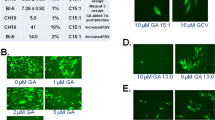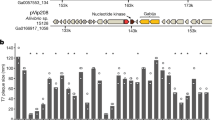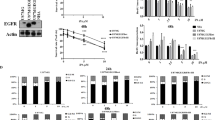Abstract
THE dimeric indole alkaloids, vinblastine and vincristine, were isolated during the investigations1,2 of the reported hypoglycaemic activity3 of Vinca rosea Linn. Although the occurrence of hypoglycaemia could not be substantiated, the alkaloids were found to be potent oncolytic agents in some experimental systems4. Clinically, vinblastine has been useful in the treatment of lymphoma, including Hodgkin's disease, carcinomata of the breast and bronchus and certain non-malignant conditions such as Letterer–Siwe disease5. Vincristine has been used with varying degrees of success in acute lymphocytic and myelogenous leukaemia, carcinoma of the cervix, malignant lymphomata, neuroblastoma, Wilms' tumour and rhabdomyosarcoma6, as well as in certain intracranial gliomata7. Both alkaloids may suppress the immune response8. Whereas leukopaenia has been the limiting manifestation of toxicity in the use of vinblastine9, this has not usually been the case with vincristine, which produces various neuropathies10 with a picture of polyneuritis running an acute or sub-acute course11. In mice, vincristine produces degeneration of the dorsal root cells and of the myelin sheath of the sciatic and median nerves, and inhibits the proliferation of the Schwann cells12. The present study was undertaken in an attempt to find a biochemical basis for the neurotoxicity.
This is a preview of subscription content, access via your institution
Access options
Subscribe to this journal
Receive 51 print issues and online access
$199.00 per year
only $3.90 per issue
Buy this article
- Purchase on Springer Link
- Instant access to full article PDF
Prices may be subject to local taxes which are calculated during checkout
Similar content being viewed by others
References
Beer, C. T., Brit. Emp. Cancer Campaign, 33, 487 (1955).
Johnson, I. S., Wright, H. F., and Svoboda, G. H., J. Lab. Clin. Med., 54, 830 (1959).
Garcia, F., Proc. Eighth. Pacific Sci. Cong. Nat. Res. Council Philippines., 4, A 182 (1954).
Cutts, J. H., Cancer Res., 21, 168 (1961).
Svoboda, G. H., Proc. First Symp. Groupe Européen Chimiothérapie Anticancereuse, 106, 18 (Excerpta Medica Foundation, Amsterdam, 1966).
Haddy, T. B., Fernbach, D. J., Watkins, W. L., Sullivan, M. P., and Windmiller, J., Cancer Chemother. Rep., 41, 41 (1964).
Lasman, L. P., Pearce, G. W., and Gan, J., Lancet, i, 296 (1963).
Aisenberg, A. C., and Wilkes, B., J. Clin. Invest., 43, 2394 (1964).
Armstrong, J. G., Clin. Med., 73, 41 (1966).
Johnson, I. S., Armstrong, J. G., Gorman, M., and Burnett, J. P., Cancer Res., 23, 1390 (1963).
Hildebrand, J., and Coers, C., Proc. First Symp. Groupe Européen Chimiothérapie Anticancereuse, 106, 176 (Excerpta Medica Foundation, Amsterdam, 1966).
Uy, Q. L., Johns, R. J., and Owens, A. H., Fed. Proc., 25, 454 (1966).
Creasey, W. A., and Markiw, M. E., Biochem. Pharmacol., 13, 135 (1964).
Creasey, W. A., and Markiw, M. E., Biochim. Biophys. Acta, 87, 601 (1964).
Author information
Authors and Affiliations
Rights and permissions
About this article
Cite this article
AGUSTIN, B., CREASEY, W. Vinca Alkaloids and the Synthesis of RNA in Mouse Brain. Nature 215, 965–966 (1967). https://doi.org/10.1038/215965a0
Received:
Revised:
Issue Date:
DOI: https://doi.org/10.1038/215965a0
This article is cited by
Comments
By submitting a comment you agree to abide by our Terms and Community Guidelines. If you find something abusive or that does not comply with our terms or guidelines please flag it as inappropriate.



